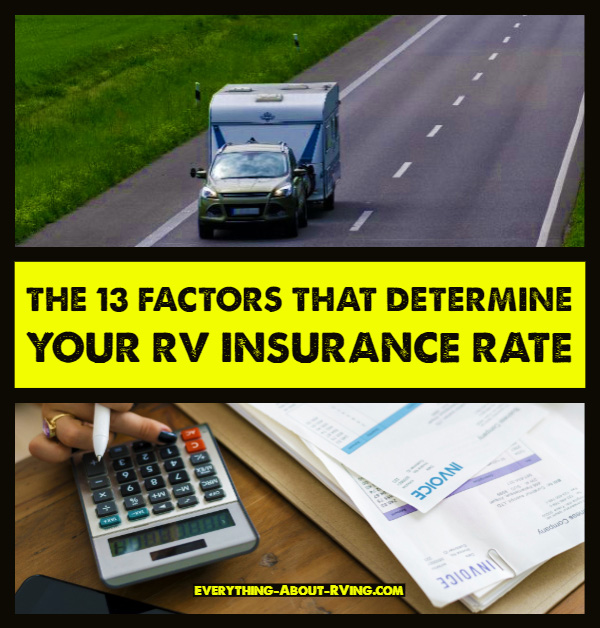The 13 Factors that Determine Your RV Insurance Rate
"The factors that determine your RV insurance rates often go undisclosed"
The 13 Factors that Determine Your RV Insurance Rate
By: Thom Kingsley
The factors that determine your RV insurance rates often go undisclosed, leaving insurance buyers in the dark and making decisions about prices that don't seem to add up. This article illustrates the key factors that determine your RV insurance rate and offers suggestions for saving as much money as possible when you purchase coverage.
1) Storage Location - by State and by Zip Code If you store your RV in Florida during hurricane season, there's a higher potential for wind and flood damage than if you store it in Arkansas. In certain states and zip codes, crimes are more likely to occur. Your decision on where to store your RV when it's not in use affects your overall insurance rate. Talk to your RV insurance agent to determine if it could pay you to store it in a zip code - or state - away from your current location. Your RV may need to be registered in the state where you store it though, so be sure to discuss this factor with your agent.
2) Type of Use - Full-Timer vs. Recreational If you plan to live in your RV full-time, you need an insurance policy that works like a floating home-owners policy that follows you everywhere you go. If you're a weekend warrior, you can get different coverage that won't cost you as much. Be honest when you're signing up for your policy though - saving a little money can end up costing you thousands if your claims adjuster thinks you've fudged the truth during your application.
3) Membership with RV Association In addition to a number of perks such as reduced rates at RV parks, your membership at the RV association of your choice could earn you a discount on your insurance rates. This is likely something that's mentioned in the brochures or on the website of your selected RV association. Be sure to mention any memberships when you're talking with your RV insurance sales rep.
4) Discount for Multiple Policies with a Company Mention your current insurance companies when talking with your insurance agent, as you may be eligible for a multiple-policy discount. Be prepared on your call by gathering the names of your current insurance providers beforehand.
5) Deductible Options - a Higher Deductible Equals Lower Rates This one's obvious, but it's something people often agonize over when they're discussing options with an agent. Make sure you know what your out-of-pocket-expense tolerance is before you start discussing this factor. Knowing what you can afford will save you the agony of having to make a snap decision that could have a big affect on your future financial situation. If you have a small fund set aside and collecting interest for damages, you could well save a little chunk on your insurance costs.
6) Type of Unit For some insurance companies, a class A motor home is more expensive than a class C to insure. If insurance price is of no concern to you, don't worry about this factor; however, if you're looking to keep your fixed costs as low as possible, you might do some advance research to make sure you're getting the cheapest-to-insure RV possible.
7) Previous RV Ownership Do you have any previous RV driving experience? Your insurance agent will likely ask you about your past RV driving history, but if not be sure to let them know how long you've been an RVer as you may be eligible for discounts.
8) Age There are some perks that come with growing older - one of them is lower RV insurance rates. Check with your agent to see if there are any discounts you've earned through the sheer virtue of the duration of your life's experience.
9) Driving History RV insurance companies look at your driving history in non-RV vehicles. They have to start somewhere. If your record is relatively clear of accidents and claims that were your fault, then you could be looking at a decent-sized discount.
10) Insurance Claims History If you have a long history of opening insurance accounts and soon after filing a claim, your new RV agency is going to see you as a risk. Your history is likely to be a strong factor in your final insurance rate. Be sure to minimize the number of claims you're making - insurance companies pay an independent agency that tracks an individual's claims and protects them much the way credit ratings protect credit companies.
11) Home Ownership Discounts Owning a home can affect your RV insurance costs too - it shows insurance companies that you're likely not a full-timer, and displays your level of responsibility. If you're curious about your savings on this, just ask your agent while you're on the phone.
12) Marital Status Insurance companies believe your marital status affects how safely you drive, and the likelihood that you'll make a claim. You may feel differently when you're lost and arguing with your beloved about missed turns in the middle of a windstorm. Either way, your status does affect your insurance rates.
13) Your Credit Rating Finally, your RV insurance company believes that the manner in which you treat your credit could be a strong indicator of how you're going to treat your RV. If you've got good credit, you're likely to see a small decrease in your insurance rates. If you're curious about the size of the decrease, be sure to check with your insurance agent.
About The Author
RV America finds you the lowest rates for your RV insurance by comparing coverage from six major rv insurance companies so contact RV America today by visiting http://www.rv-insurance-coverage.com or calling 1 800-400-0186.
Do you have any suggestions or comments on this topic? You can add them to this page by using the comments section located below.
